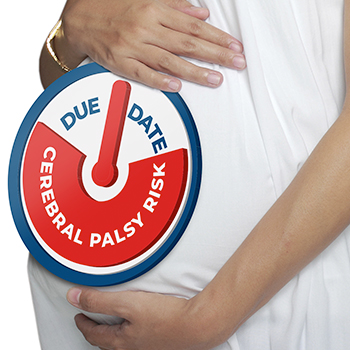
According to a major new research study, if a baby is delivered early or late, it increases the odds that the infant will develop cerebral palsy (CP). Although premature birth has long been known as a factor in cerebral palsy, this is the first study that links past-term delivery to higher CP risk.
As published in this month’s Journal of the American Medical Association, the Norwegian study looked at 1,682,441 children born from 1967-2001 at 37 through 44 weeks and who had no congenital anomalies (birth defects). The children were tracked through 2005. Of the babies born late, 1,938 developed cerebral palsy, according to the study led by Dr. Dag Moster, University of Bergen.
Compared to babies born at a normal 40 weeks gestation, the study showed:
- Babies born at 37 weeks had a 90% increase in risk for cerebral palsy
- Babies born at 42 weeks had a 40% increase in risk for cerebral palsy.
The strongest association was among infants with the gestational ages of 37 weeks and 42 weeks, the report said. Adjusting for sex, the mother’s age and socioeconomic factors had little effect on these associations, the researchers noted. However, Dr. Moster said the biological mechanisms that underlie this association are still unclear. “A possible explanation may be that the neonatal brain is especially vulnerable the more the baby is born away from a gestational age of 40 weeks,” he said.
An alternative explanation may be that fetuses prone to develop cerebral palsy have a disturbance in timing of birth, making them more prone to be delivered either early or late, Moster added.
Although the study did not reach any conclusion about what caused the increase in CP in these post and pre-term infants, it’s clear that medical errors can contribute to the timing of a delivery. Babies born too early or too late as a result of mismanagement of obstetrical care, such as failure to use appropriate measures to stop premature labor or misreading of electric fetal heart monitor tracings are all too common. (More information on Electronic Fetal Monitoring)
Other medical errors known to have caused CP include:
- Unnecessarily delayed C-sections
- Failure to resuscitate a newborn needing help breathing
- Failure to diagnose or treat an infection
- Negligent application of vacuum extractor equipment or forceps
- Misdiagnosis of fetal position in the uterus
The latest study on the underlying causes of CP moves us even closer to being able to prevent this life-long and debilitating disorder. But a good first step is pushing doctors and hospitals to reduce medical errors.
If your baby was diagnosed with CP due to medical negligence, contact our professional personal injury lawyers for a free legal consultation.
